LGBT+ End-of-Life Care Needs and Challenges
VerifiedAdded on 2020/04/21
|13
|3045
|63
AI Summary
This assignment delves into the complex intersection of LGBT+ identities and end-of-life care. It examines the specific needs and preferences of LGBT+ individuals at the end of life, highlighting the unique challenges they may face within healthcare systems. The provided research articles shed light on issues like moral distress in critical care nurses, cultural competence training for healthcare professionals, and the importance of specialized palliative care models that are inclusive and sensitive to the diverse experiences of LGBT+ patients.
Contribute Materials
Your contribution can guide someone’s learning journey. Share your
documents today.
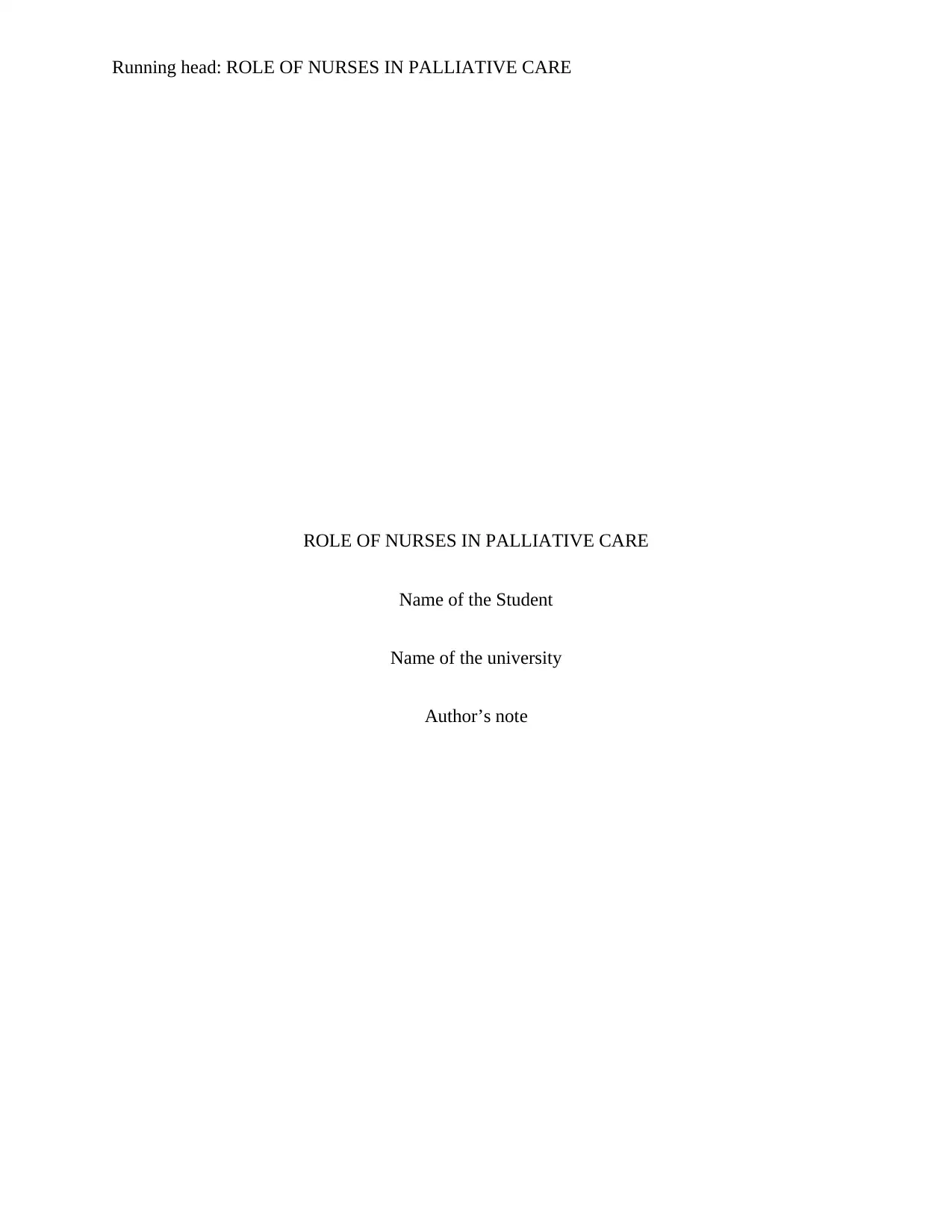
Running head: ROLE OF NURSES IN PALLIATIVE CARE
ROLE OF NURSES IN PALLIATIVE CARE
Name of the Student
Name of the university
Author’s note
ROLE OF NURSES IN PALLIATIVE CARE
Name of the Student
Name of the university
Author’s note
Secure Best Marks with AI Grader
Need help grading? Try our AI Grader for instant feedback on your assignments.
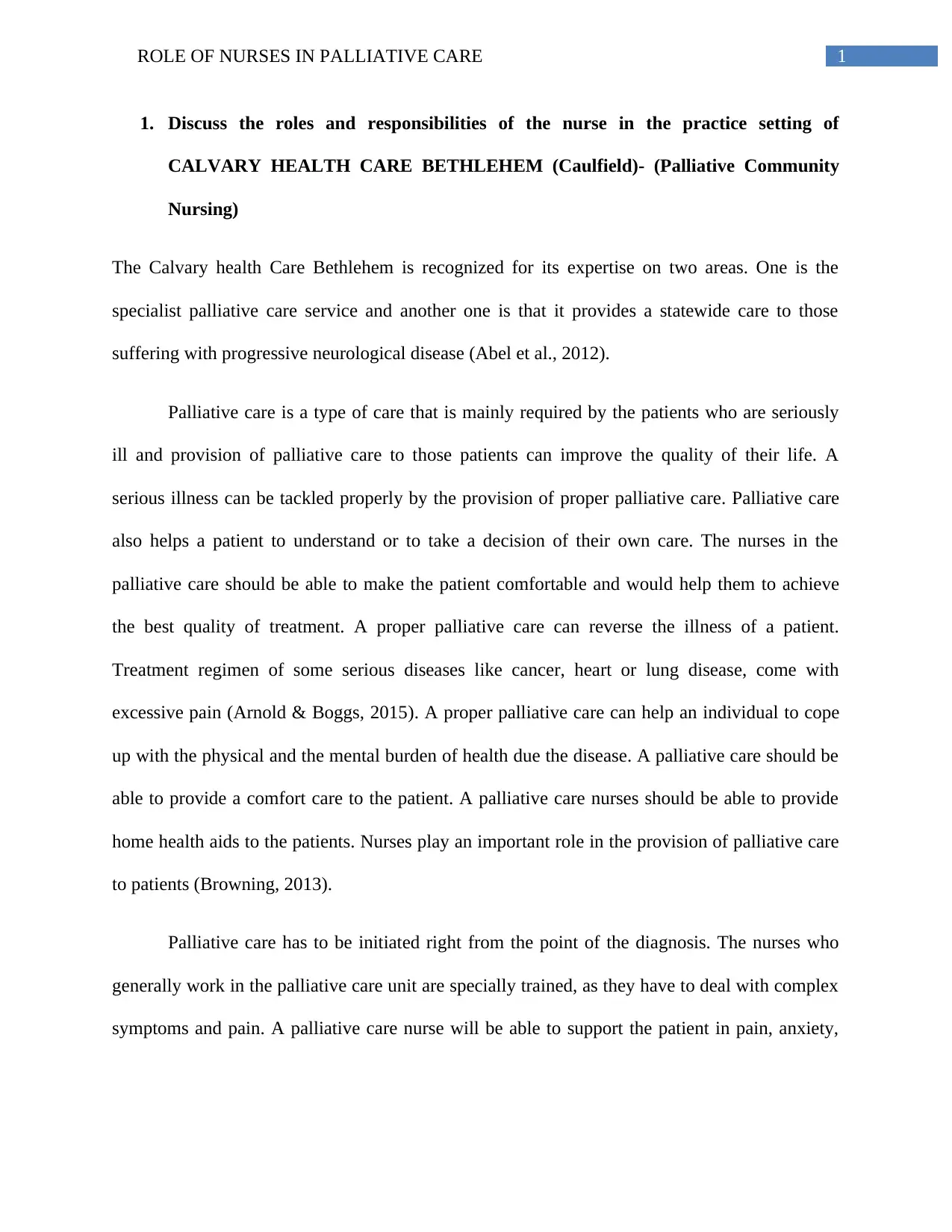
1ROLE OF NURSES IN PALLIATIVE CARE
1. Discuss the roles and responsibilities of the nurse in the practice setting of
CALVARY HEALTH CARE BETHLEHEM (Caulfield)- (Palliative Community
Nursing)
The Calvary health Care Bethlehem is recognized for its expertise on two areas. One is the
specialist palliative care service and another one is that it provides a statewide care to those
suffering with progressive neurological disease (Abel et al., 2012).
Palliative care is a type of care that is mainly required by the patients who are seriously
ill and provision of palliative care to those patients can improve the quality of their life. A
serious illness can be tackled properly by the provision of proper palliative care. Palliative care
also helps a patient to understand or to take a decision of their own care. The nurses in the
palliative care should be able to make the patient comfortable and would help them to achieve
the best quality of treatment. A proper palliative care can reverse the illness of a patient.
Treatment regimen of some serious diseases like cancer, heart or lung disease, come with
excessive pain (Arnold & Boggs, 2015). A proper palliative care can help an individual to cope
up with the physical and the mental burden of health due the disease. A palliative care should be
able to provide a comfort care to the patient. A palliative care nurses should be able to provide
home health aids to the patients. Nurses play an important role in the provision of palliative care
to patients (Browning, 2013).
Palliative care has to be initiated right from the point of the diagnosis. The nurses who
generally work in the palliative care unit are specially trained, as they have to deal with complex
symptoms and pain. A palliative care nurse will be able to support the patient in pain, anxiety,
1. Discuss the roles and responsibilities of the nurse in the practice setting of
CALVARY HEALTH CARE BETHLEHEM (Caulfield)- (Palliative Community
Nursing)
The Calvary health Care Bethlehem is recognized for its expertise on two areas. One is the
specialist palliative care service and another one is that it provides a statewide care to those
suffering with progressive neurological disease (Abel et al., 2012).
Palliative care is a type of care that is mainly required by the patients who are seriously
ill and provision of palliative care to those patients can improve the quality of their life. A
serious illness can be tackled properly by the provision of proper palliative care. Palliative care
also helps a patient to understand or to take a decision of their own care. The nurses in the
palliative care should be able to make the patient comfortable and would help them to achieve
the best quality of treatment. A proper palliative care can reverse the illness of a patient.
Treatment regimen of some serious diseases like cancer, heart or lung disease, come with
excessive pain (Arnold & Boggs, 2015). A proper palliative care can help an individual to cope
up with the physical and the mental burden of health due the disease. A palliative care should be
able to provide a comfort care to the patient. A palliative care nurses should be able to provide
home health aids to the patients. Nurses play an important role in the provision of palliative care
to patients (Browning, 2013).
Palliative care has to be initiated right from the point of the diagnosis. The nurses who
generally work in the palliative care unit are specially trained, as they have to deal with complex
symptoms and pain. A palliative care nurse will be able to support the patient in pain, anxiety,
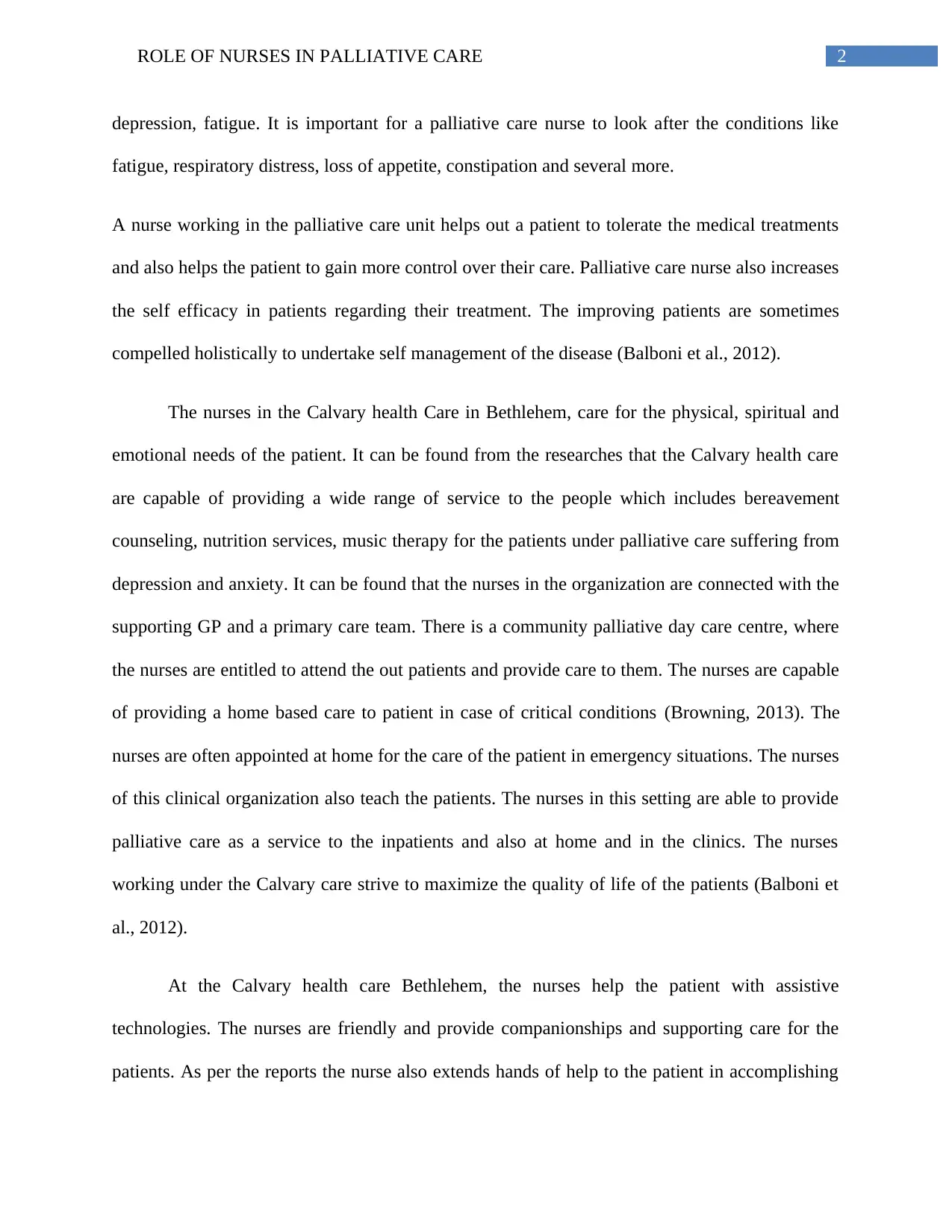
2ROLE OF NURSES IN PALLIATIVE CARE
depression, fatigue. It is important for a palliative care nurse to look after the conditions like
fatigue, respiratory distress, loss of appetite, constipation and several more.
A nurse working in the palliative care unit helps out a patient to tolerate the medical treatments
and also helps the patient to gain more control over their care. Palliative care nurse also increases
the self efficacy in patients regarding their treatment. The improving patients are sometimes
compelled holistically to undertake self management of the disease (Balboni et al., 2012).
The nurses in the Calvary health Care in Bethlehem, care for the physical, spiritual and
emotional needs of the patient. It can be found from the researches that the Calvary health care
are capable of providing a wide range of service to the people which includes bereavement
counseling, nutrition services, music therapy for the patients under palliative care suffering from
depression and anxiety. It can be found that the nurses in the organization are connected with the
supporting GP and a primary care team. There is a community palliative day care centre, where
the nurses are entitled to attend the out patients and provide care to them. The nurses are capable
of providing a home based care to patient in case of critical conditions (Browning, 2013). The
nurses are often appointed at home for the care of the patient in emergency situations. The nurses
of this clinical organization also teach the patients. The nurses in this setting are able to provide
palliative care as a service to the inpatients and also at home and in the clinics. The nurses
working under the Calvary care strive to maximize the quality of life of the patients (Balboni et
al., 2012).
At the Calvary health care Bethlehem, the nurses help the patient with assistive
technologies. The nurses are friendly and provide companionships and supporting care for the
patients. As per the reports the nurse also extends hands of help to the patient in accomplishing
depression, fatigue. It is important for a palliative care nurse to look after the conditions like
fatigue, respiratory distress, loss of appetite, constipation and several more.
A nurse working in the palliative care unit helps out a patient to tolerate the medical treatments
and also helps the patient to gain more control over their care. Palliative care nurse also increases
the self efficacy in patients regarding their treatment. The improving patients are sometimes
compelled holistically to undertake self management of the disease (Balboni et al., 2012).
The nurses in the Calvary health Care in Bethlehem, care for the physical, spiritual and
emotional needs of the patient. It can be found from the researches that the Calvary health care
are capable of providing a wide range of service to the people which includes bereavement
counseling, nutrition services, music therapy for the patients under palliative care suffering from
depression and anxiety. It can be found that the nurses in the organization are connected with the
supporting GP and a primary care team. There is a community palliative day care centre, where
the nurses are entitled to attend the out patients and provide care to them. The nurses are capable
of providing a home based care to patient in case of critical conditions (Browning, 2013). The
nurses are often appointed at home for the care of the patient in emergency situations. The nurses
of this clinical organization also teach the patients. The nurses in this setting are able to provide
palliative care as a service to the inpatients and also at home and in the clinics. The nurses
working under the Calvary care strive to maximize the quality of life of the patients (Balboni et
al., 2012).
At the Calvary health care Bethlehem, the nurses help the patient with assistive
technologies. The nurses are friendly and provide companionships and supporting care for the
patients. As per the reports the nurse also extends hands of help to the patient in accomplishing
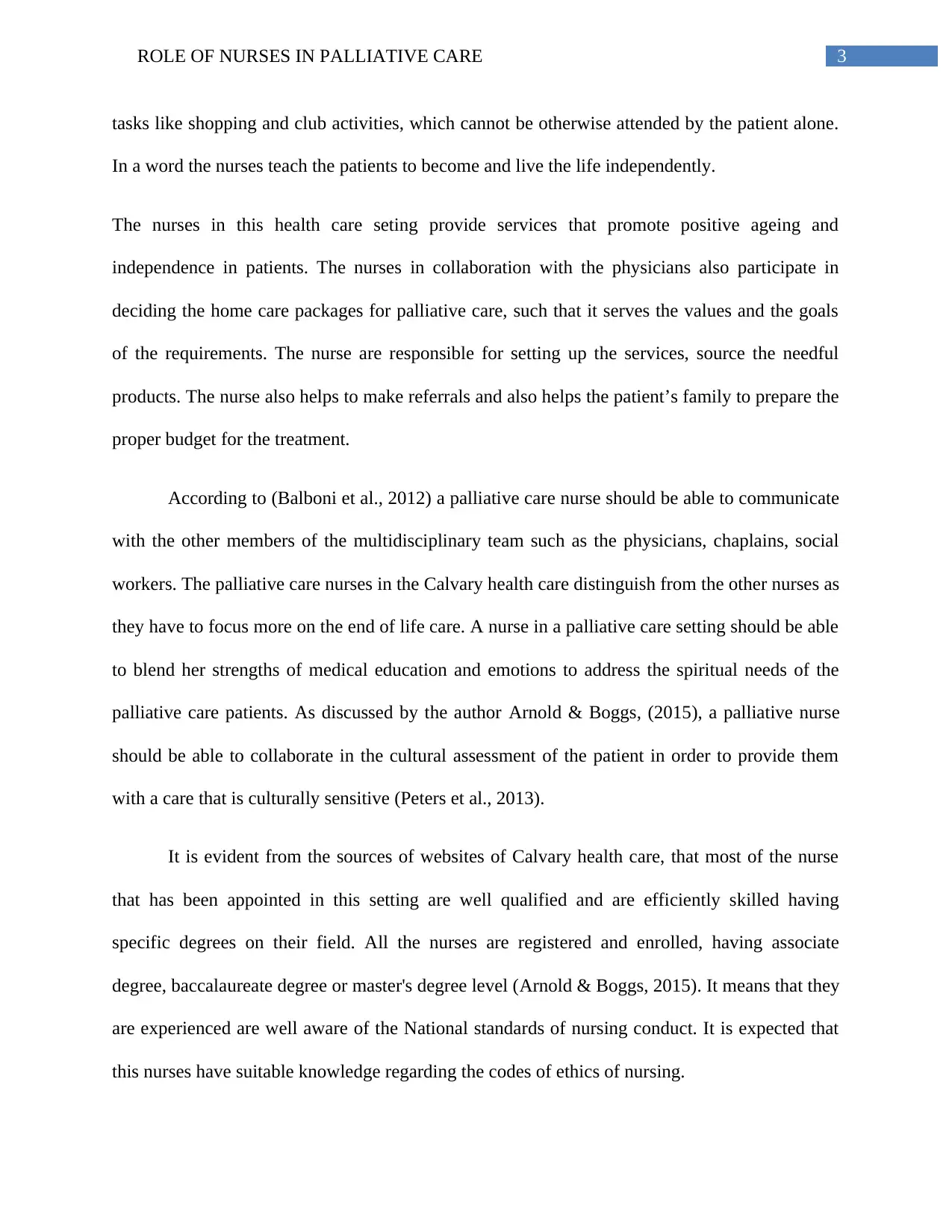
3ROLE OF NURSES IN PALLIATIVE CARE
tasks like shopping and club activities, which cannot be otherwise attended by the patient alone.
In a word the nurses teach the patients to become and live the life independently.
The nurses in this health care seting provide services that promote positive ageing and
independence in patients. The nurses in collaboration with the physicians also participate in
deciding the home care packages for palliative care, such that it serves the values and the goals
of the requirements. The nurse are responsible for setting up the services, source the needful
products. The nurse also helps to make referrals and also helps the patient’s family to prepare the
proper budget for the treatment.
According to (Balboni et al., 2012) a palliative care nurse should be able to communicate
with the other members of the multidisciplinary team such as the physicians, chaplains, social
workers. The palliative care nurses in the Calvary health care distinguish from the other nurses as
they have to focus more on the end of life care. A nurse in a palliative care setting should be able
to blend her strengths of medical education and emotions to address the spiritual needs of the
palliative care patients. As discussed by the author Arnold & Boggs, (2015), a palliative nurse
should be able to collaborate in the cultural assessment of the patient in order to provide them
with a care that is culturally sensitive (Peters et al., 2013).
It is evident from the sources of websites of Calvary health care, that most of the nurse
that has been appointed in this setting are well qualified and are efficiently skilled having
specific degrees on their field. All the nurses are registered and enrolled, having associate
degree, baccalaureate degree or master's degree level (Arnold & Boggs, 2015). It means that they
are experienced are well aware of the National standards of nursing conduct. It is expected that
this nurses have suitable knowledge regarding the codes of ethics of nursing.
tasks like shopping and club activities, which cannot be otherwise attended by the patient alone.
In a word the nurses teach the patients to become and live the life independently.
The nurses in this health care seting provide services that promote positive ageing and
independence in patients. The nurses in collaboration with the physicians also participate in
deciding the home care packages for palliative care, such that it serves the values and the goals
of the requirements. The nurse are responsible for setting up the services, source the needful
products. The nurse also helps to make referrals and also helps the patient’s family to prepare the
proper budget for the treatment.
According to (Balboni et al., 2012) a palliative care nurse should be able to communicate
with the other members of the multidisciplinary team such as the physicians, chaplains, social
workers. The palliative care nurses in the Calvary health care distinguish from the other nurses as
they have to focus more on the end of life care. A nurse in a palliative care setting should be able
to blend her strengths of medical education and emotions to address the spiritual needs of the
palliative care patients. As discussed by the author Arnold & Boggs, (2015), a palliative nurse
should be able to collaborate in the cultural assessment of the patient in order to provide them
with a care that is culturally sensitive (Peters et al., 2013).
It is evident from the sources of websites of Calvary health care, that most of the nurse
that has been appointed in this setting are well qualified and are efficiently skilled having
specific degrees on their field. All the nurses are registered and enrolled, having associate
degree, baccalaureate degree or master's degree level (Arnold & Boggs, 2015). It means that they
are experienced are well aware of the National standards of nursing conduct. It is expected that
this nurses have suitable knowledge regarding the codes of ethics of nursing.
Secure Best Marks with AI Grader
Need help grading? Try our AI Grader for instant feedback on your assignments.
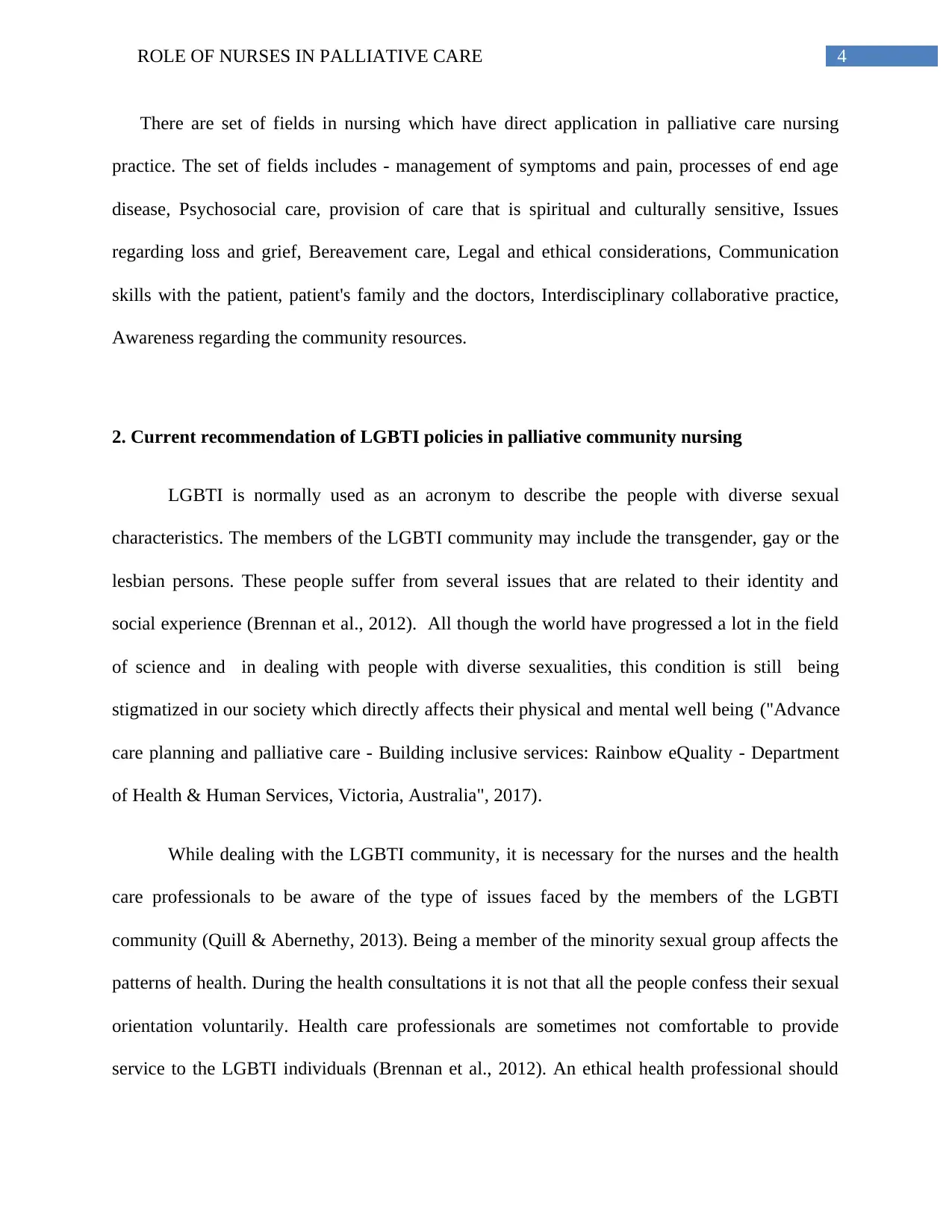
4ROLE OF NURSES IN PALLIATIVE CARE
There are set of fields in nursing which have direct application in palliative care nursing
practice. The set of fields includes - management of symptoms and pain, processes of end age
disease, Psychosocial care, provision of care that is spiritual and culturally sensitive, Issues
regarding loss and grief, Bereavement care, Legal and ethical considerations, Communication
skills with the patient, patient's family and the doctors, Interdisciplinary collaborative practice,
Awareness regarding the community resources.
2. Current recommendation of LGBTI policies in palliative community nursing
LGBTI is normally used as an acronym to describe the people with diverse sexual
characteristics. The members of the LGBTI community may include the transgender, gay or the
lesbian persons. These people suffer from several issues that are related to their identity and
social experience (Brennan et al., 2012). All though the world have progressed a lot in the field
of science and in dealing with people with diverse sexualities, this condition is still being
stigmatized in our society which directly affects their physical and mental well being ("Advance
care planning and palliative care - Building inclusive services: Rainbow eQuality - Department
of Health & Human Services, Victoria, Australia", 2017).
While dealing with the LGBTI community, it is necessary for the nurses and the health
care professionals to be aware of the type of issues faced by the members of the LGBTI
community (Quill & Abernethy, 2013). Being a member of the minority sexual group affects the
patterns of health. During the health consultations it is not that all the people confess their sexual
orientation voluntarily. Health care professionals are sometimes not comfortable to provide
service to the LGBTI individuals (Brennan et al., 2012). An ethical health professional should
There are set of fields in nursing which have direct application in palliative care nursing
practice. The set of fields includes - management of symptoms and pain, processes of end age
disease, Psychosocial care, provision of care that is spiritual and culturally sensitive, Issues
regarding loss and grief, Bereavement care, Legal and ethical considerations, Communication
skills with the patient, patient's family and the doctors, Interdisciplinary collaborative practice,
Awareness regarding the community resources.
2. Current recommendation of LGBTI policies in palliative community nursing
LGBTI is normally used as an acronym to describe the people with diverse sexual
characteristics. The members of the LGBTI community may include the transgender, gay or the
lesbian persons. These people suffer from several issues that are related to their identity and
social experience (Brennan et al., 2012). All though the world have progressed a lot in the field
of science and in dealing with people with diverse sexualities, this condition is still being
stigmatized in our society which directly affects their physical and mental well being ("Advance
care planning and palliative care - Building inclusive services: Rainbow eQuality - Department
of Health & Human Services, Victoria, Australia", 2017).
While dealing with the LGBTI community, it is necessary for the nurses and the health
care professionals to be aware of the type of issues faced by the members of the LGBTI
community (Quill & Abernethy, 2013). Being a member of the minority sexual group affects the
patterns of health. During the health consultations it is not that all the people confess their sexual
orientation voluntarily. Health care professionals are sometimes not comfortable to provide
service to the LGBTI individuals (Brennan et al., 2012). An ethical health professional should
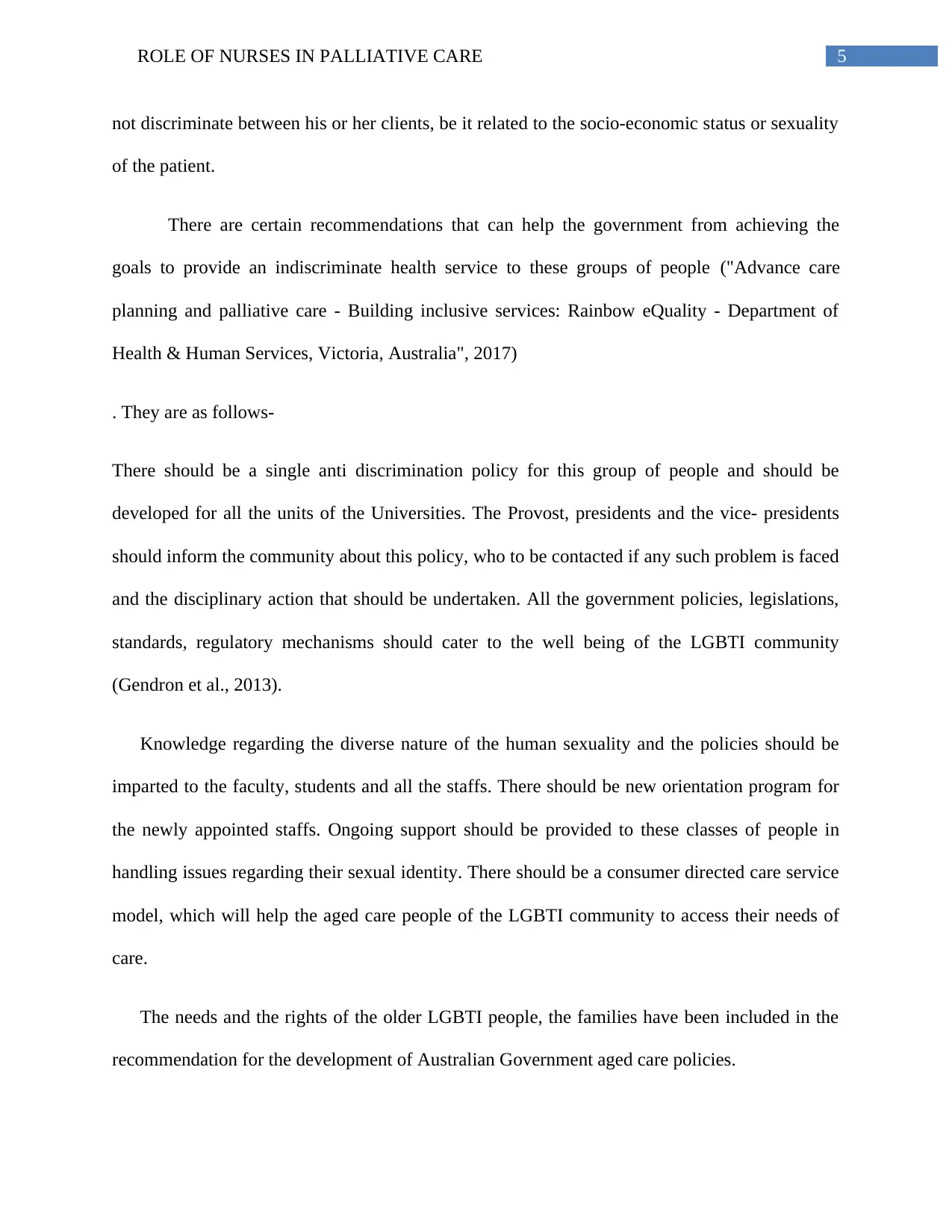
5ROLE OF NURSES IN PALLIATIVE CARE
not discriminate between his or her clients, be it related to the socio-economic status or sexuality
of the patient.
There are certain recommendations that can help the government from achieving the
goals to provide an indiscriminate health service to these groups of people ("Advance care
planning and palliative care - Building inclusive services: Rainbow eQuality - Department of
Health & Human Services, Victoria, Australia", 2017)
. They are as follows-
There should be a single anti discrimination policy for this group of people and should be
developed for all the units of the Universities. The Provost, presidents and the vice- presidents
should inform the community about this policy, who to be contacted if any such problem is faced
and the disciplinary action that should be undertaken. All the government policies, legislations,
standards, regulatory mechanisms should cater to the well being of the LGBTI community
(Gendron et al., 2013).
Knowledge regarding the diverse nature of the human sexuality and the policies should be
imparted to the faculty, students and all the staffs. There should be new orientation program for
the newly appointed staffs. Ongoing support should be provided to these classes of people in
handling issues regarding their sexual identity. There should be a consumer directed care service
model, which will help the aged care people of the LGBTI community to access their needs of
care.
The needs and the rights of the older LGBTI people, the families have been included in the
recommendation for the development of Australian Government aged care policies.
not discriminate between his or her clients, be it related to the socio-economic status or sexuality
of the patient.
There are certain recommendations that can help the government from achieving the
goals to provide an indiscriminate health service to these groups of people ("Advance care
planning and palliative care - Building inclusive services: Rainbow eQuality - Department of
Health & Human Services, Victoria, Australia", 2017)
. They are as follows-
There should be a single anti discrimination policy for this group of people and should be
developed for all the units of the Universities. The Provost, presidents and the vice- presidents
should inform the community about this policy, who to be contacted if any such problem is faced
and the disciplinary action that should be undertaken. All the government policies, legislations,
standards, regulatory mechanisms should cater to the well being of the LGBTI community
(Gendron et al., 2013).
Knowledge regarding the diverse nature of the human sexuality and the policies should be
imparted to the faculty, students and all the staffs. There should be new orientation program for
the newly appointed staffs. Ongoing support should be provided to these classes of people in
handling issues regarding their sexual identity. There should be a consumer directed care service
model, which will help the aged care people of the LGBTI community to access their needs of
care.
The needs and the rights of the older LGBTI people, the families have been included in the
recommendation for the development of Australian Government aged care policies.
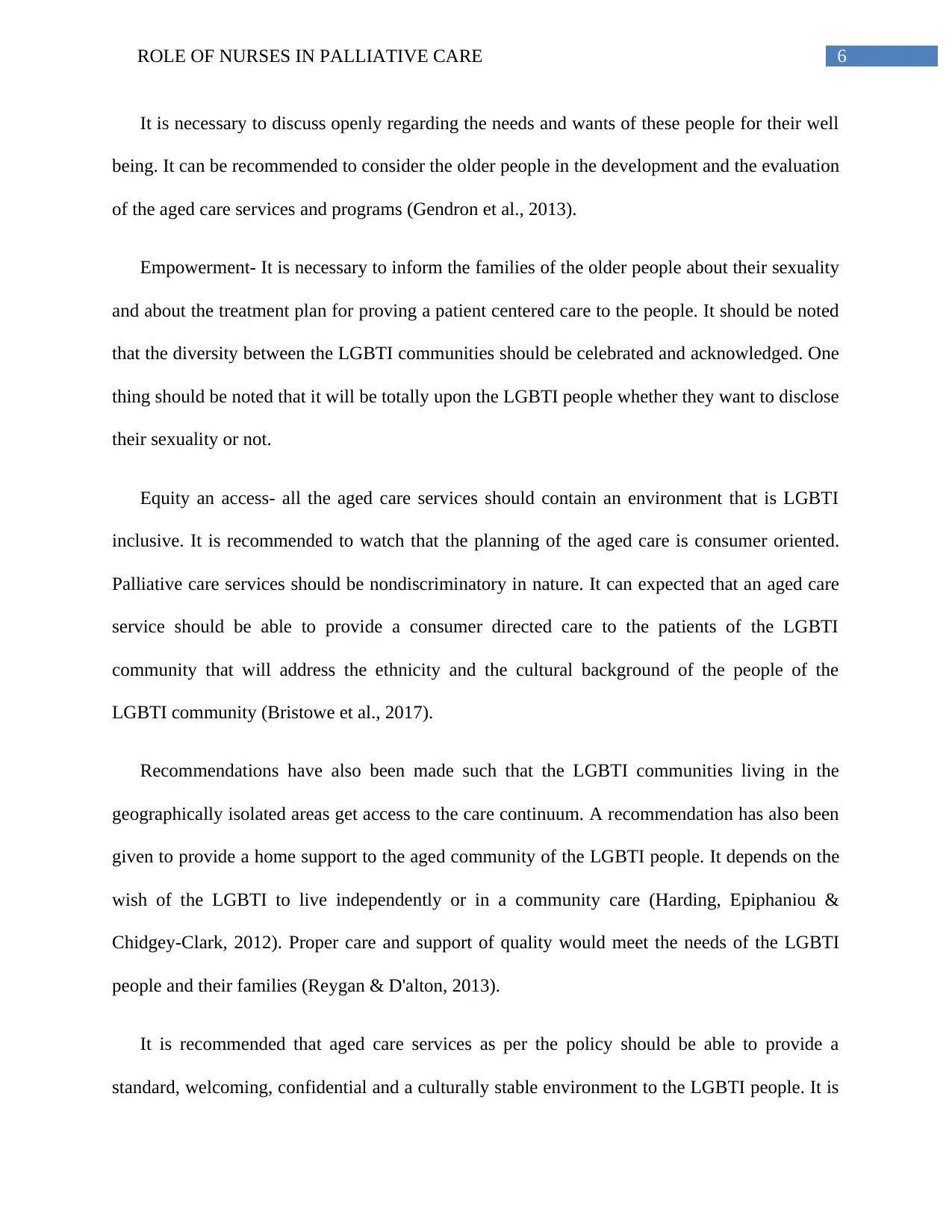
6ROLE OF NURSES IN PALLIATIVE CARE
It is necessary to discuss openly regarding the needs and wants of these people for their well
being. It can be recommended to consider the older people in the development and the evaluation
of the aged care services and programs (Gendron et al., 2013).
Empowerment- It is necessary to inform the families of the older people about their sexuality
and about the treatment plan for proving a patient centered care to the people. It should be noted
that the diversity between the LGBTI communities should be celebrated and acknowledged. One
thing should be noted that it will be totally upon the LGBTI people whether they want to disclose
their sexuality or not.
Equity an access- all the aged care services should contain an environment that is LGBTI
inclusive. It is recommended to watch that the planning of the aged care is consumer oriented.
Palliative care services should be nondiscriminatory in nature. It can expected that an aged care
service should be able to provide a consumer directed care to the patients of the LGBTI
community that will address the ethnicity and the cultural background of the people of the
LGBTI community (Bristowe et al., 2017).
Recommendations have also been made such that the LGBTI communities living in the
geographically isolated areas get access to the care continuum. A recommendation has also been
given to provide a home support to the aged community of the LGBTI people. It depends on the
wish of the LGBTI to live independently or in a community care (Harding, Epiphaniou &
Chidgey-Clark, 2012). Proper care and support of quality would meet the needs of the LGBTI
people and their families (Reygan & D'alton, 2013).
It is recommended that aged care services as per the policy should be able to provide a
standard, welcoming, confidential and a culturally stable environment to the LGBTI people. It is
It is necessary to discuss openly regarding the needs and wants of these people for their well
being. It can be recommended to consider the older people in the development and the evaluation
of the aged care services and programs (Gendron et al., 2013).
Empowerment- It is necessary to inform the families of the older people about their sexuality
and about the treatment plan for proving a patient centered care to the people. It should be noted
that the diversity between the LGBTI communities should be celebrated and acknowledged. One
thing should be noted that it will be totally upon the LGBTI people whether they want to disclose
their sexuality or not.
Equity an access- all the aged care services should contain an environment that is LGBTI
inclusive. It is recommended to watch that the planning of the aged care is consumer oriented.
Palliative care services should be nondiscriminatory in nature. It can expected that an aged care
service should be able to provide a consumer directed care to the patients of the LGBTI
community that will address the ethnicity and the cultural background of the people of the
LGBTI community (Bristowe et al., 2017).
Recommendations have also been made such that the LGBTI communities living in the
geographically isolated areas get access to the care continuum. A recommendation has also been
given to provide a home support to the aged community of the LGBTI people. It depends on the
wish of the LGBTI to live independently or in a community care (Harding, Epiphaniou &
Chidgey-Clark, 2012). Proper care and support of quality would meet the needs of the LGBTI
people and their families (Reygan & D'alton, 2013).
It is recommended that aged care services as per the policy should be able to provide a
standard, welcoming, confidential and a culturally stable environment to the LGBTI people. It is
Paraphrase This Document
Need a fresh take? Get an instant paraphrase of this document with our AI Paraphraser
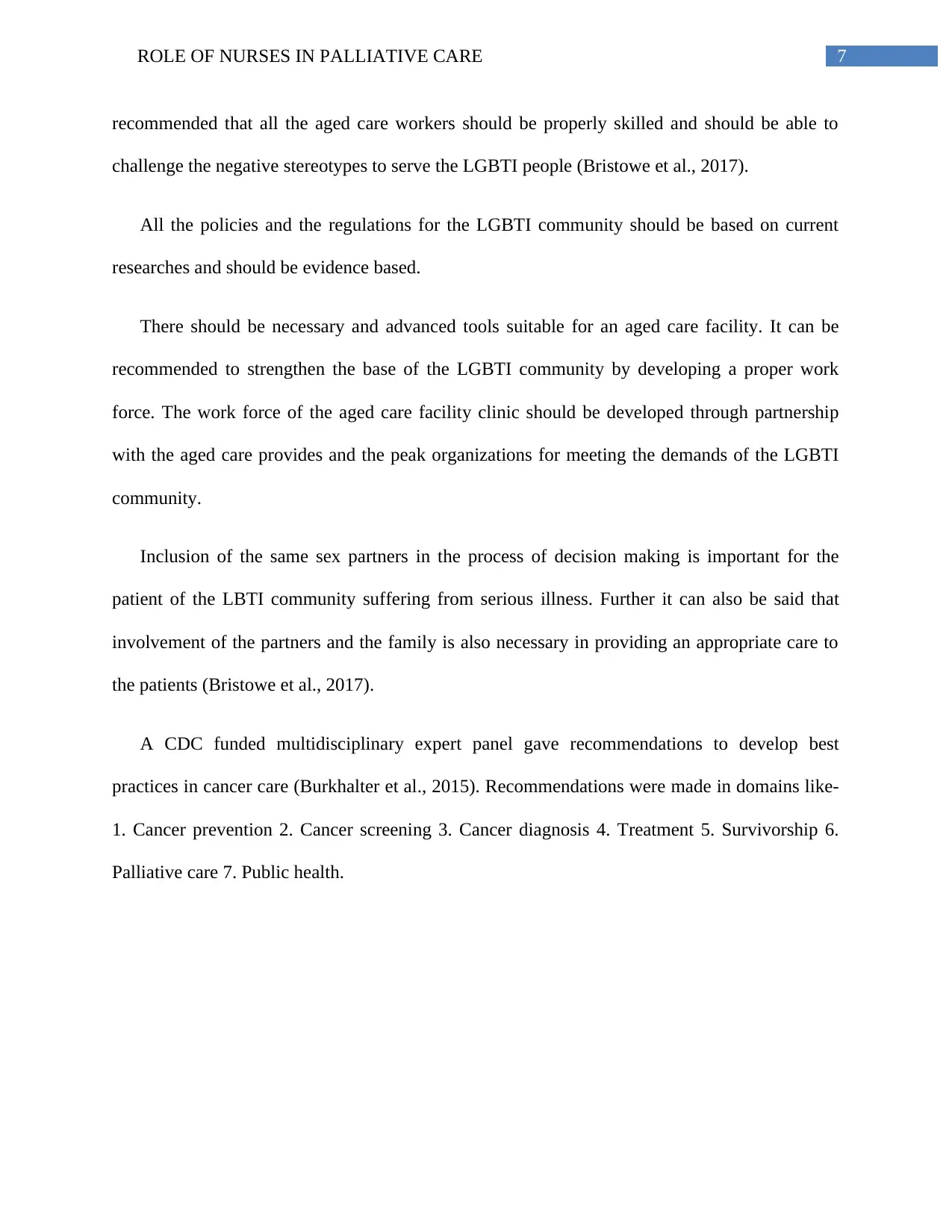
7ROLE OF NURSES IN PALLIATIVE CARE
recommended that all the aged care workers should be properly skilled and should be able to
challenge the negative stereotypes to serve the LGBTI people (Bristowe et al., 2017).
All the policies and the regulations for the LGBTI community should be based on current
researches and should be evidence based.
There should be necessary and advanced tools suitable for an aged care facility. It can be
recommended to strengthen the base of the LGBTI community by developing a proper work
force. The work force of the aged care facility clinic should be developed through partnership
with the aged care provides and the peak organizations for meeting the demands of the LGBTI
community.
Inclusion of the same sex partners in the process of decision making is important for the
patient of the LBTI community suffering from serious illness. Further it can also be said that
involvement of the partners and the family is also necessary in providing an appropriate care to
the patients (Bristowe et al., 2017).
A CDC funded multidisciplinary expert panel gave recommendations to develop best
practices in cancer care (Burkhalter et al., 2015). Recommendations were made in domains like-
1. Cancer prevention 2. Cancer screening 3. Cancer diagnosis 4. Treatment 5. Survivorship 6.
Palliative care 7. Public health.
recommended that all the aged care workers should be properly skilled and should be able to
challenge the negative stereotypes to serve the LGBTI people (Bristowe et al., 2017).
All the policies and the regulations for the LGBTI community should be based on current
researches and should be evidence based.
There should be necessary and advanced tools suitable for an aged care facility. It can be
recommended to strengthen the base of the LGBTI community by developing a proper work
force. The work force of the aged care facility clinic should be developed through partnership
with the aged care provides and the peak organizations for meeting the demands of the LGBTI
community.
Inclusion of the same sex partners in the process of decision making is important for the
patient of the LBTI community suffering from serious illness. Further it can also be said that
involvement of the partners and the family is also necessary in providing an appropriate care to
the patients (Bristowe et al., 2017).
A CDC funded multidisciplinary expert panel gave recommendations to develop best
practices in cancer care (Burkhalter et al., 2015). Recommendations were made in domains like-
1. Cancer prevention 2. Cancer screening 3. Cancer diagnosis 4. Treatment 5. Survivorship 6.
Palliative care 7. Public health.
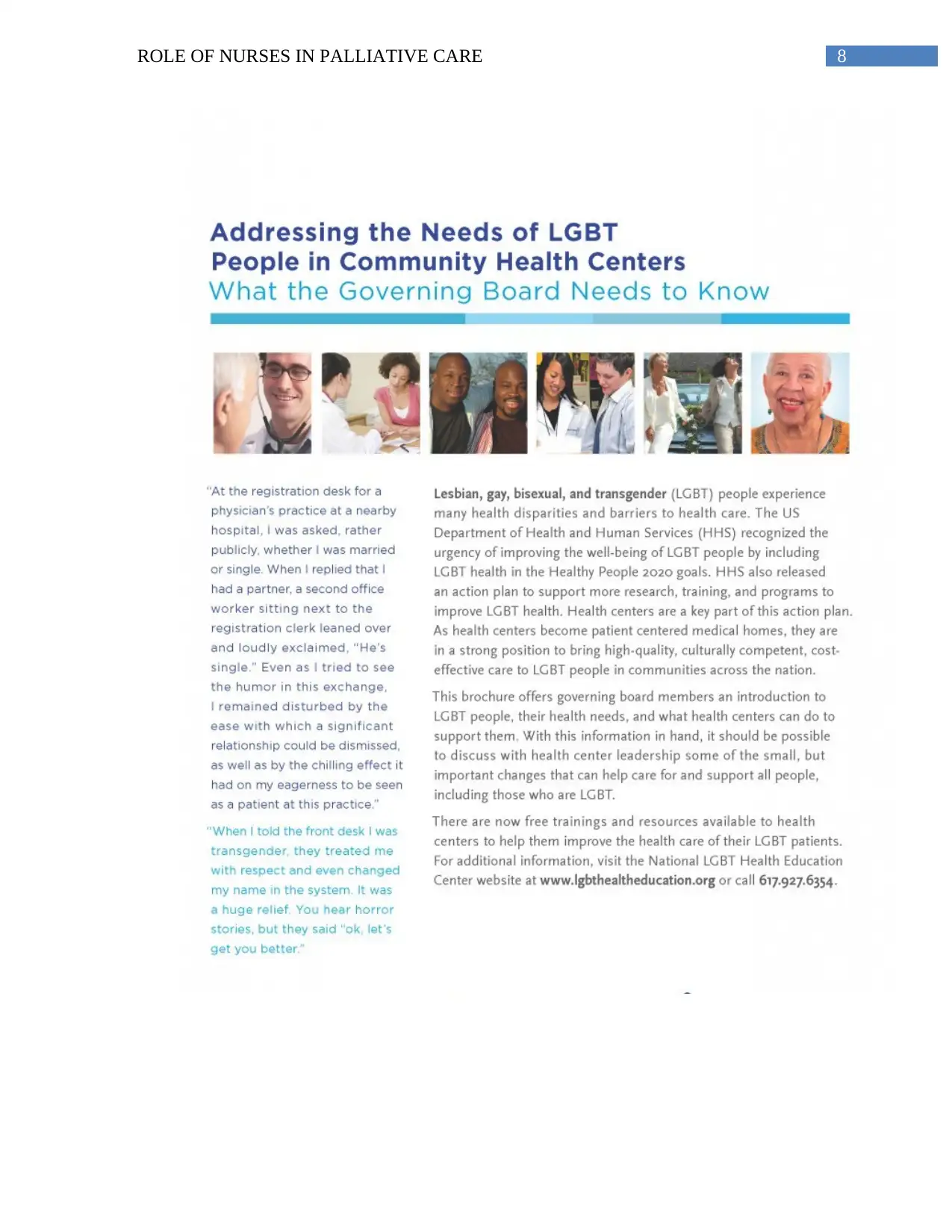
8ROLE OF NURSES IN PALLIATIVE CARE
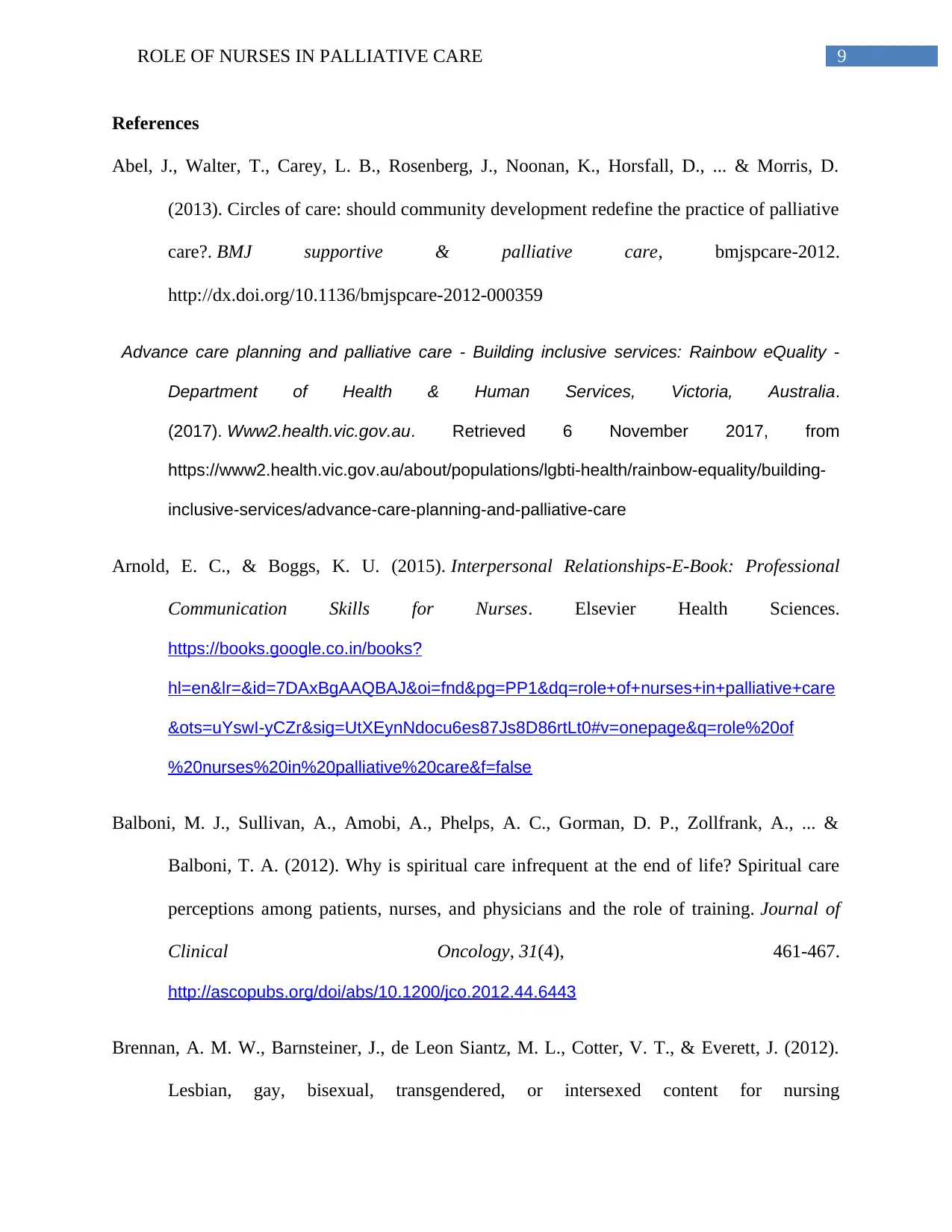
9ROLE OF NURSES IN PALLIATIVE CARE
References
Abel, J., Walter, T., Carey, L. B., Rosenberg, J., Noonan, K., Horsfall, D., ... & Morris, D.
(2013). Circles of care: should community development redefine the practice of palliative
care?. BMJ supportive & palliative care, bmjspcare-2012.
http://dx.doi.org/10.1136/bmjspcare-2012-000359
Advance care planning and palliative care - Building inclusive services: Rainbow eQuality -
Department of Health & Human Services, Victoria, Australia.
(2017). Www2.health.vic.gov.au. Retrieved 6 November 2017, from
https://www2.health.vic.gov.au/about/populations/lgbti-health/rainbow-equality/building-
inclusive-services/advance-care-planning-and-palliative-care
Arnold, E. C., & Boggs, K. U. (2015). Interpersonal Relationships-E-Book: Professional
Communication Skills for Nurses. Elsevier Health Sciences.
https://books.google.co.in/books?
hl=en&lr=&id=7DAxBgAAQBAJ&oi=fnd&pg=PP1&dq=role+of+nurses+in+palliative+care
&ots=uYswI-yCZr&sig=UtXEynNdocu6es87Js8D86rtLt0#v=onepage&q=role%20of
%20nurses%20in%20palliative%20care&f=false
Balboni, M. J., Sullivan, A., Amobi, A., Phelps, A. C., Gorman, D. P., Zollfrank, A., ... &
Balboni, T. A. (2012). Why is spiritual care infrequent at the end of life? Spiritual care
perceptions among patients, nurses, and physicians and the role of training. Journal of
Clinical Oncology, 31(4), 461-467.
http://ascopubs.org/doi/abs/10.1200/jco.2012.44.6443
Brennan, A. M. W., Barnsteiner, J., de Leon Siantz, M. L., Cotter, V. T., & Everett, J. (2012).
Lesbian, gay, bisexual, transgendered, or intersexed content for nursing
References
Abel, J., Walter, T., Carey, L. B., Rosenberg, J., Noonan, K., Horsfall, D., ... & Morris, D.
(2013). Circles of care: should community development redefine the practice of palliative
care?. BMJ supportive & palliative care, bmjspcare-2012.
http://dx.doi.org/10.1136/bmjspcare-2012-000359
Advance care planning and palliative care - Building inclusive services: Rainbow eQuality -
Department of Health & Human Services, Victoria, Australia.
(2017). Www2.health.vic.gov.au. Retrieved 6 November 2017, from
https://www2.health.vic.gov.au/about/populations/lgbti-health/rainbow-equality/building-
inclusive-services/advance-care-planning-and-palliative-care
Arnold, E. C., & Boggs, K. U. (2015). Interpersonal Relationships-E-Book: Professional
Communication Skills for Nurses. Elsevier Health Sciences.
https://books.google.co.in/books?
hl=en&lr=&id=7DAxBgAAQBAJ&oi=fnd&pg=PP1&dq=role+of+nurses+in+palliative+care
&ots=uYswI-yCZr&sig=UtXEynNdocu6es87Js8D86rtLt0#v=onepage&q=role%20of
%20nurses%20in%20palliative%20care&f=false
Balboni, M. J., Sullivan, A., Amobi, A., Phelps, A. C., Gorman, D. P., Zollfrank, A., ... &
Balboni, T. A. (2012). Why is spiritual care infrequent at the end of life? Spiritual care
perceptions among patients, nurses, and physicians and the role of training. Journal of
Clinical Oncology, 31(4), 461-467.
http://ascopubs.org/doi/abs/10.1200/jco.2012.44.6443
Brennan, A. M. W., Barnsteiner, J., de Leon Siantz, M. L., Cotter, V. T., & Everett, J. (2012).
Lesbian, gay, bisexual, transgendered, or intersexed content for nursing
Secure Best Marks with AI Grader
Need help grading? Try our AI Grader for instant feedback on your assignments.
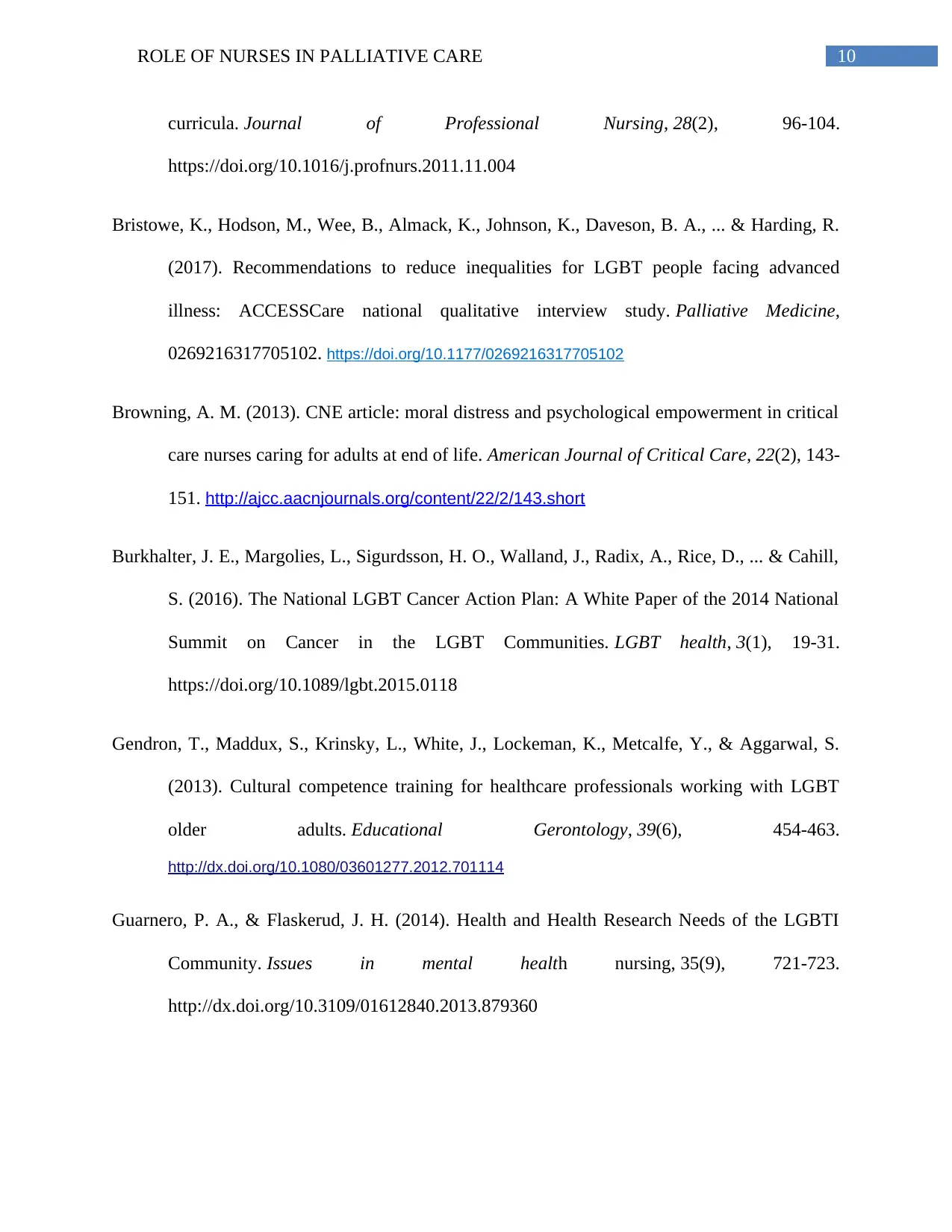
10ROLE OF NURSES IN PALLIATIVE CARE
curricula. Journal of Professional Nursing, 28(2), 96-104.
https://doi.org/10.1016/j.profnurs.2011.11.004
Bristowe, K., Hodson, M., Wee, B., Almack, K., Johnson, K., Daveson, B. A., ... & Harding, R.
(2017). Recommendations to reduce inequalities for LGBT people facing advanced
illness: ACCESSCare national qualitative interview study. Palliative Medicine,
0269216317705102. https://doi.org/10.1177/0269216317705102
Browning, A. M. (2013). CNE article: moral distress and psychological empowerment in critical
care nurses caring for adults at end of life. American Journal of Critical Care, 22(2), 143-
151. http://ajcc.aacnjournals.org/content/22/2/143.short
Burkhalter, J. E., Margolies, L., Sigurdsson, H. O., Walland, J., Radix, A., Rice, D., ... & Cahill,
S. (2016). The National LGBT Cancer Action Plan: A White Paper of the 2014 National
Summit on Cancer in the LGBT Communities. LGBT health, 3(1), 19-31.
https://doi.org/10.1089/lgbt.2015.0118
Gendron, T., Maddux, S., Krinsky, L., White, J., Lockeman, K., Metcalfe, Y., & Aggarwal, S.
(2013). Cultural competence training for healthcare professionals working with LGBT
older adults. Educational Gerontology, 39(6), 454-463.
http://dx.doi.org/10.1080/03601277.2012.701114
Guarnero, P. A., & Flaskerud, J. H. (2014). Health and Health Research Needs of the LGBTI
Community. Issues in mental health nursing, 35(9), 721-723.
http://dx.doi.org/10.3109/01612840.2013.879360
curricula. Journal of Professional Nursing, 28(2), 96-104.
https://doi.org/10.1016/j.profnurs.2011.11.004
Bristowe, K., Hodson, M., Wee, B., Almack, K., Johnson, K., Daveson, B. A., ... & Harding, R.
(2017). Recommendations to reduce inequalities for LGBT people facing advanced
illness: ACCESSCare national qualitative interview study. Palliative Medicine,
0269216317705102. https://doi.org/10.1177/0269216317705102
Browning, A. M. (2013). CNE article: moral distress and psychological empowerment in critical
care nurses caring for adults at end of life. American Journal of Critical Care, 22(2), 143-
151. http://ajcc.aacnjournals.org/content/22/2/143.short
Burkhalter, J. E., Margolies, L., Sigurdsson, H. O., Walland, J., Radix, A., Rice, D., ... & Cahill,
S. (2016). The National LGBT Cancer Action Plan: A White Paper of the 2014 National
Summit on Cancer in the LGBT Communities. LGBT health, 3(1), 19-31.
https://doi.org/10.1089/lgbt.2015.0118
Gendron, T., Maddux, S., Krinsky, L., White, J., Lockeman, K., Metcalfe, Y., & Aggarwal, S.
(2013). Cultural competence training for healthcare professionals working with LGBT
older adults. Educational Gerontology, 39(6), 454-463.
http://dx.doi.org/10.1080/03601277.2012.701114
Guarnero, P. A., & Flaskerud, J. H. (2014). Health and Health Research Needs of the LGBTI
Community. Issues in mental health nursing, 35(9), 721-723.
http://dx.doi.org/10.3109/01612840.2013.879360
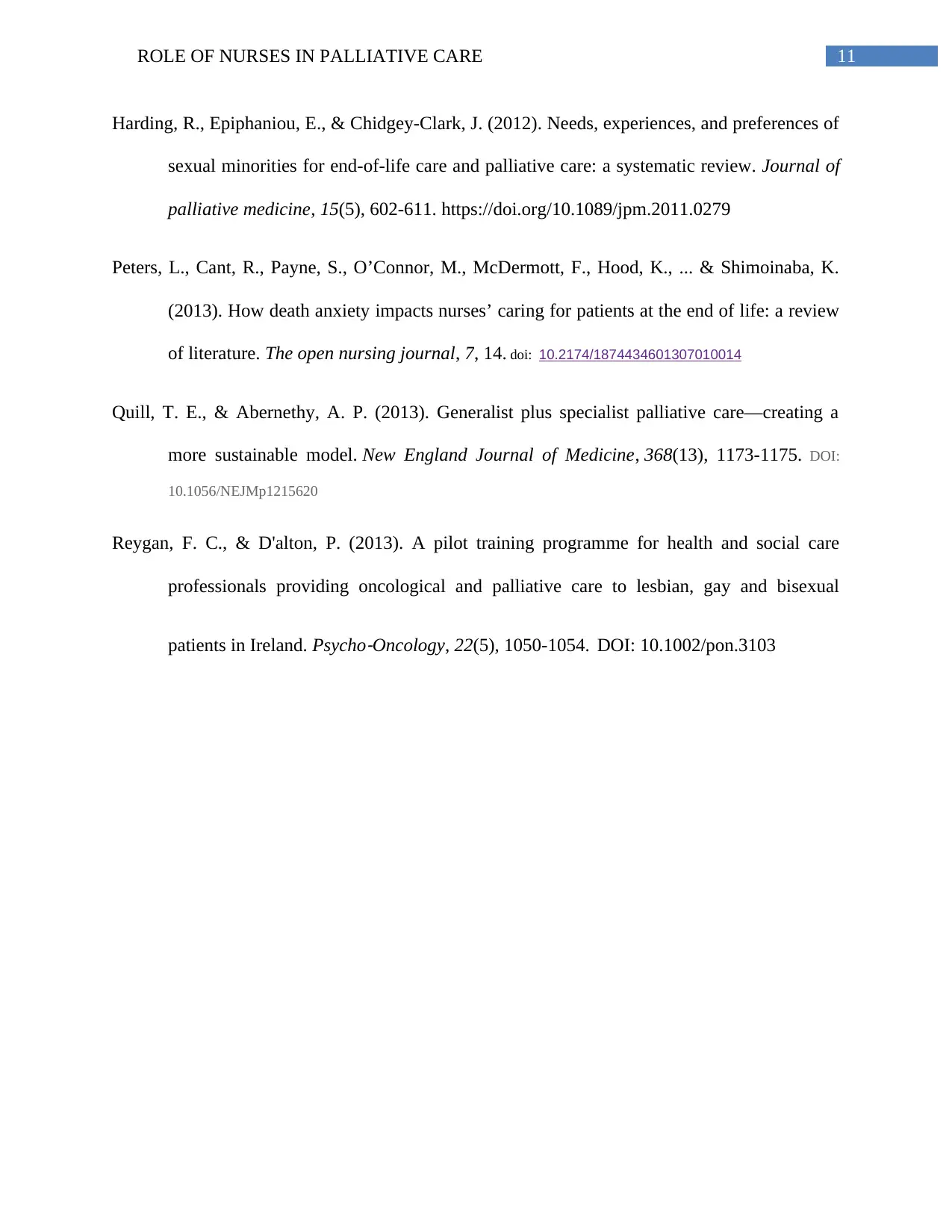
11ROLE OF NURSES IN PALLIATIVE CARE
Harding, R., Epiphaniou, E., & Chidgey-Clark, J. (2012). Needs, experiences, and preferences of
sexual minorities for end-of-life care and palliative care: a systematic review. Journal of
palliative medicine, 15(5), 602-611. https://doi.org/10.1089/jpm.2011.0279
Peters, L., Cant, R., Payne, S., O’Connor, M., McDermott, F., Hood, K., ... & Shimoinaba, K.
(2013). How death anxiety impacts nurses’ caring for patients at the end of life: a review
of literature. The open nursing journal, 7, 14. doi: 10.2174/1874434601307010014
Quill, T. E., & Abernethy, A. P. (2013). Generalist plus specialist palliative care—creating a
more sustainable model. New England Journal of Medicine, 368(13), 1173-1175. DOI:
10.1056/NEJMp1215620
Reygan, F. C., & D'alton, P. (2013). A pilot training programme for health and social care
professionals providing oncological and palliative care to lesbian, gay and bisexual
patients in Ireland. Psycho
‐Oncology, 22(5), 1050-1054. DOI: 10.1002/pon.3103
Harding, R., Epiphaniou, E., & Chidgey-Clark, J. (2012). Needs, experiences, and preferences of
sexual minorities for end-of-life care and palliative care: a systematic review. Journal of
palliative medicine, 15(5), 602-611. https://doi.org/10.1089/jpm.2011.0279
Peters, L., Cant, R., Payne, S., O’Connor, M., McDermott, F., Hood, K., ... & Shimoinaba, K.
(2013). How death anxiety impacts nurses’ caring for patients at the end of life: a review
of literature. The open nursing journal, 7, 14. doi: 10.2174/1874434601307010014
Quill, T. E., & Abernethy, A. P. (2013). Generalist plus specialist palliative care—creating a
more sustainable model. New England Journal of Medicine, 368(13), 1173-1175. DOI:
10.1056/NEJMp1215620
Reygan, F. C., & D'alton, P. (2013). A pilot training programme for health and social care
professionals providing oncological and palliative care to lesbian, gay and bisexual
patients in Ireland. Psycho
‐Oncology, 22(5), 1050-1054. DOI: 10.1002/pon.3103

12ROLE OF NURSES IN PALLIATIVE CARE
1 out of 13
Related Documents
Your All-in-One AI-Powered Toolkit for Academic Success.
+13062052269
info@desklib.com
Available 24*7 on WhatsApp / Email
![[object Object]](/_next/static/media/star-bottom.7253800d.svg)
Unlock your academic potential
© 2024 | Zucol Services PVT LTD | All rights reserved.





